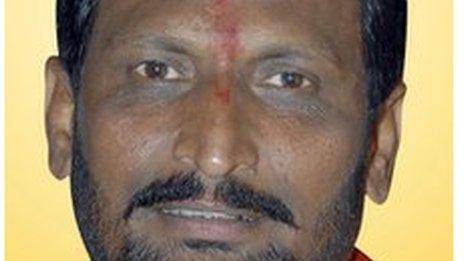India porn ban: How the government was forced to reverse course
- Published
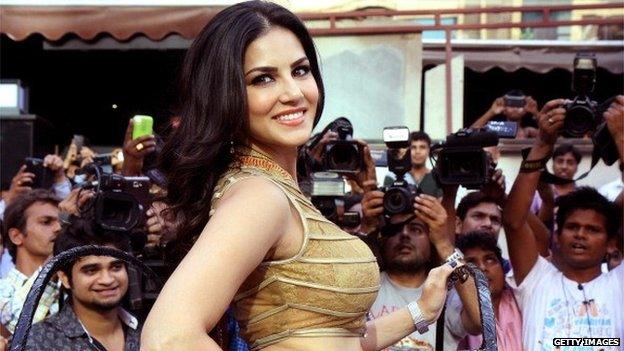
Sunny Leone is India's best known porn star
It started as a quiet, almost innocuous government order, which was also surprisingly precise.
Last week, India's telecoms ministry ordered internet service providers to block access to 857 websites hosting pornographic content.
But not even the government could have predicted the scale and level of outrage that the order unleashed as Indians heaped criticism and scorn on the move.
A week later, it's seemingly scaled down the directive. A new order, as vague as the earlier one was precise, now asks the service providers to block access only to those sites which have child pornographic content. It's led to more confusion, criticism and yes, more ridicule.
So why exactly did the government go ahead with the move?
The ban had its genesis in a petition filed in India's Supreme Court by a lawyer seeking a complete ban on porn sites because, he argued, it was socially destructive and promoted violence against women.
Watching porn, he said in his petition, puts the country's security in danger. It also propels men to commit sex crimes. The court's reaction was to criticise the government's inability to act against internet sites that promoted child pornography.
The government's reaction was to ban porn sites.
#NextBanIdea
Across India, people fumed, raged and ranted. Radio and television talk shows filled up with irate callers speaking both for and against the ban. One radio station was inundated with calls for its debate, To porn or not to porn.
Social media was abuzz as many described it as an invasion of privacy and an attempt at moral policing. A bestselling author, Chetan Bhagat, pleaded with the government to not ban porn in a tweet.
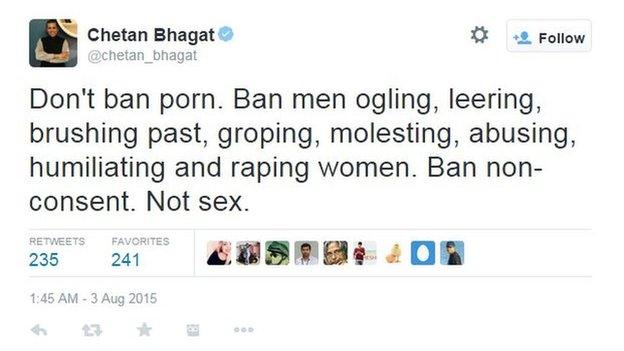
The hashtag #NextBanIdea began trending on Twitter as many decided to take to humour and come out with a list of things the government could consider banning - from the Facebook game Candy Crush, to people who take selfies and relatives who badger young Indians to get married.
The governing BJP, which runs the federal government, was also left red-faced after some pointed out that a few years ago some of its politicians were caught on camera watching pornographic clips on their mobile phones inside a state legislative assembly.
Ban backfire?
For many the ban is futile. Indians are believed to be among the largest consumers of internet pornography - number four in a list of countries published by Pornhub, the world's largest pornographic video-sharing website, after the United States, Britain and Canada.
In fact, there are suggestions the move may have had the opposite effect. One Indian website, Quint, notes that Google Trends recorded a sharp increase in keyword searches for pornographic content, external and porn stars over the past week.
And then there is India's rich history of celebrating sexuality. Some pointed out the irony of the ban in a country that gave the world the Kama Sutra, the ancient text on sexual etiquette and practice.
Others wanted to know if the government planned to cover or block access to the country's centuries-old temples and cave art with sexually explicit sculptures and paintings.

India online porn facts
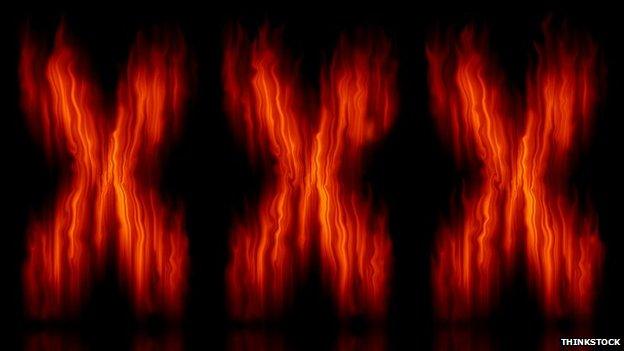
Indians who watch porn online spend an average eight minutes, 22 seconds per visit, compared with a world average of eight minutes, 56 seconds
They view an average 7.32 pages per visit, compared with the world average of 7.6 pages
Sunny Leone is the most popular porn star in India
The next most popular search terms are: Indian, Lisa Ann, Indian wife, Indian bhabhi
A quarter of Pornhub's users in India are female, just above the world average of 23%
Around Diwali, the festival of light, online traffic to Pornhub drops by 36%, but around Eid al-Fitr it rises by 9%
Source: Pornhub/Quartz India, external

Culture of intolerance
The debate has also sparked concern over what some see as a growing culture of intolerance promoted by a series of actions by the right-wing BJP government, many of whose members are self-professed Hindu nationalists.
Some Indian states, governed by the BJP, have banned the production and consumption of beef - because the cow is considered sacred for India's Hindu majority. The government also banned the broadcast of a BBC documentary on rape, arguing that it defamed India.
The film Fifty Shades of Grey was also banned, external at around the time that the government-run censor board came up with a large list of words that could no longer be spoken on screen - these included lesbian and Bombay (the old name for India's financial capital Mumbai).
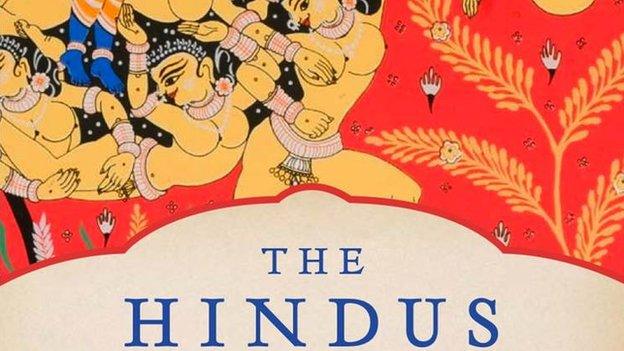
Wendy Doniger's book, The Hindus: An Alternative History, was withdrawn by Penguin India last year
But it's not just limited to the BJP. Under India's previous Congress-led government, a controversial book on Hinduism by American academic Wendy Doniger was banned.
For many, these moves threaten India's democracy and tradition of cultural pluralism. There's a fear that the space for criticism and outspoken views is slowly being constricted.
For now at least, the move to ban porn has backfired - the government has been forced to come out and say that it supports freedom of communication. And Indians can go back to surfing for sex.
- Published5 August 2015
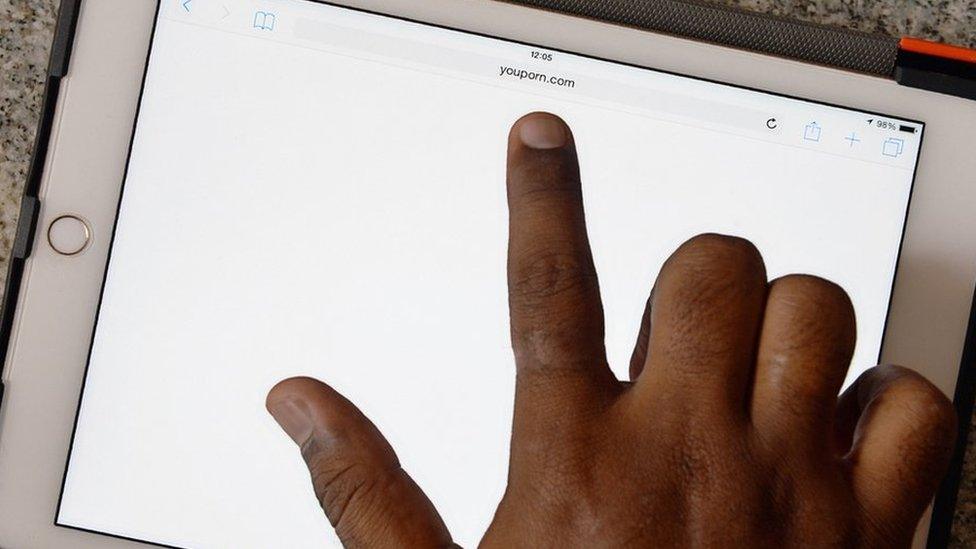
- Published3 August 2015
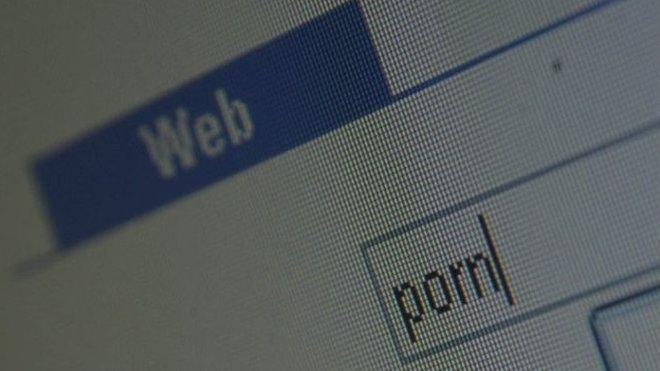
- Published8 February 2012
